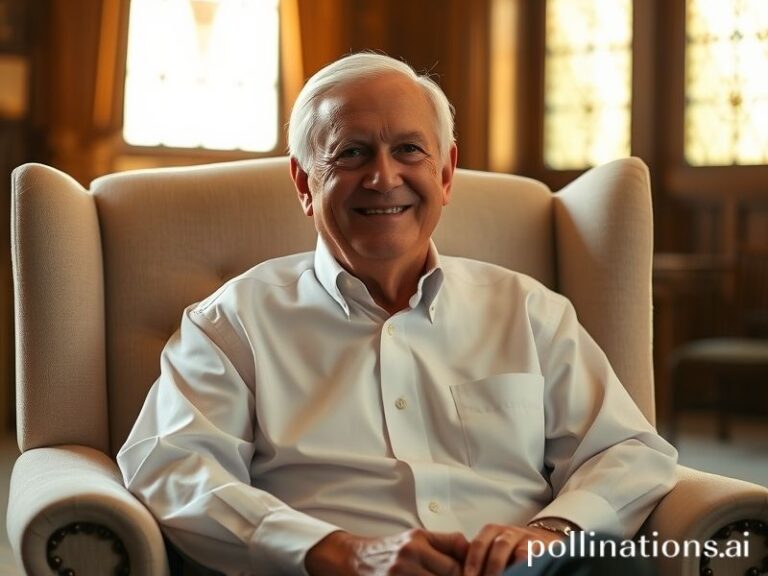Michael Strahan: How One Gap-Toothed Grin Became America’s Most Unlikely Global Export
Michael Strahan: The Gap-Toothed American Export the World Never Asked For (But Got Anyway)
PARIS—In most countries, a 1.5-centimeter diastema between one’s incisors is considered an orthodontic emergency. In the United States, it became a billion-dollar brand. Michael Strahan, the former New York Giants pass-rusher turned television polymath, has managed to turn a dental liability into a global calling card—proof that American exceptionalism now comes with its own orthodontist on retainer.
From Lagos to Lima, airport lounges flicker with Strahan’s grin on loop: Good Morning America’s chipper jock-uncle, NFL on Fox’s shoulder-padded analyst, the host who somehow convinced ABC that watching celebrities stuff their faces with water buffalo testicles would pass as “international goodwill.” The gag, of course, is that Strahan’s ubiquity is less about talent than scale: the same algorithmic centrifuge that once exported blue jeans and fast food now exports 6’5″ former linebackers with the wattage of a small solar farm.
Europeans, who still pretend to prefer subtlety, have reacted with the predictable cocktail of envy and disdain. Le Monde once described Strahan as “un symbole de l’optimisme américain industriel,” which roughly translates to “a man too cheerful to be trusted.” Meanwhile, Chinese state television edits out the gap in post-production, apparently worried the void might be interpreted as a metaphor for American infrastructure. Only the Australians seem genuinely charmed; after all, they too enjoy turning physical imperfections into national mascots—see: the late Steve Irwin.
The broader significance is that Strahan represents a new category of soft-power weapon: the ex-athlete who never quite exits stage left. In an era when traditional diplomacy is conducted via Twitter flame wars and summit selfies, Strahan offers a kind of performative amiability that travels well across borders. He smiles, the world smiles back—mostly because it’s easier than explaining the U.S. debt ceiling. International relations professors now cite “Strahanization” as the process by which aggressive American brands re-package themselves as harmless lifestyle gurus. (Step 1: Lose the helmet. Step 2: Add a tailored suit. Step 3: Repeat the word “journey” until no one remembers you once tackled people for money.)
Critics argue that this global diffusion of Strahanesque positivity is cultural Novocaine: a numbing agent that lets systemic problems fester while we clap along to daytime TV segments about dog yoga. In Sudan, where generals share power like hyenas divvying a carcass, Strahan’s Instagram reel about “morning gratitude” feels like dark satire. In Myanmar, as junta troops torch villages, the fact that Strahan is simultaneously promoting a children’s book titled “Wake Up Happy” reads as cosmic punchline. Yet the joke is on us: the algorithm doesn’t do irony, only reach.
Still, there’s something almost admirable—if you squint—about a man who turned the NFL’s concussion-inducing ballet into a transcontinental grin. The same league that produces CTE research faster than it produces Super Bowl rings now exports its alumni as cuddly ambassadors, a reputational laundering scheme so audacious it could only have been conceived in a country that also invented the pet rock. Strahan is the league’s ex-post-facto apology note, wrapped in a Macy’s Thanksgiving Day float and delivered via satellite to 197 countries that never asked for forgiveness in the first place.
Which brings us to the final, bleakly comic truth: in a fractured world where trust in institutions is plummeting faster than crypto, a gap-toothed former defensive end with a catchphrase and a charitable foundation may be the closest thing we have to a reliable narrator. The planet burns, supply chains buckle, democracy hiccups—but somewhere in a studio lot, Strahan is laughing, the gap flashing like a lighthouse for lost brand managers.
And so, from Kyiv to Karachi, we watch—partly because the remote is too far away, mostly because the alternative is the news. Strahan grins, the world grins back, and for 22 minutes plus commercials we all agree to suspend disbelief in exchange for a story about a rescued three-legged puppy. Call it escapism, call it imperial decline set to a peppy soundtrack, just don’t call it a comeback—he’s been here for years, and apparently plans to stay until the last satellite falls from orbit.







